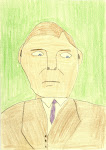
We begin with readings that are all about arrivals and firsts: the Native Americans who were here first; the first Spanish who came to Florida; the first English--Roanoke, Jamestown, the Mayflower; a book on George Washington.
Laying on the day-bed with The American Story propped up against my bent legs and Simon's head on my shoulder, I find myself coming back to the word “arrogant.” This word is new to Simon. I explain that the English at Roanoke were probably killed by the Croatoans because the English thought the native inhabitants were no better than dogs or rats. They were arrogant. That got them into trouble.
They should have asked the Indians for help planting crops and building shelters, like the English settlers did in Plymouth and Jamestown, befriending Squanto and Pocahontas. Instead, they believed the Croatoans were not worthy of respect. Instead of offering friendship, the English attacked their village.
“They were arrogant—and they were morons,” says Simon. “They were--,” and he lifts his head, smiles broadly, and runs his index-finger across his throat. “EXE-CUTE-TED!” I've explained to Simon that killing makes me nervous. Simon thinks it's his duty to help me overcome my fears.
“Morons, really? Many of us make bad decisions when we're afraid,” I say. “How do you think these first colonist felt after their long journey, arriving in the New World?”
“Well, I know from The Story of the World that Dorothy Bradford of the Mayflower killed herself. She jumped off the Mayflower and drowned. I think she had no hope.”
“Why did she have no hope?”
Simon lies there in silence and then says, “I think the trip was hard. There was a storm. They vomited.”
“That's right,” I say. “They were mostly locked in that little space below deck. The captain did not let them come up in the fresh air often. It was dark and smelly. Stinkernoodle, you hate airplanes. Sometimes you throw up because you say it smells really bad—”
“Don't talk about it!” he turns to me, looking cross. His Olympic vomiting over the Atlantic Ocean is nothing he's proud of.
“--Imagine being on a plane for 66 days and nights.”
“That would be horrible.” He covers his face with the blanket.
“And then you arrive at a new place, all tired and smelly and hungry, and there is nothing--no hotel, no friends, no bathroom, no Burger King. Just a world you have never seen before with not even a road you could walk on.”
From under the blanket I hear, “STOP! I don't want to talk about it anymore!”
Laying on the day-bed with The American Story propped up against my bent legs and Simon's head on my shoulder, I find myself coming back to the word “arrogant.” This word is new to Simon. I explain that the English at Roanoke were probably killed by the Croatoans because the English thought the native inhabitants were no better than dogs or rats. They were arrogant. That got them into trouble.
They should have asked the Indians for help planting crops and building shelters, like the English settlers did in Plymouth and Jamestown, befriending Squanto and Pocahontas. Instead, they believed the Croatoans were not worthy of respect. Instead of offering friendship, the English attacked their village.
“They were arrogant—and they were morons,” says Simon. “They were--,” and he lifts his head, smiles broadly, and runs his index-finger across his throat. “EXE-CUTE-TED!” I've explained to Simon that killing makes me nervous. Simon thinks it's his duty to help me overcome my fears.
“Morons, really? Many of us make bad decisions when we're afraid,” I say. “How do you think these first colonist felt after their long journey, arriving in the New World?”
“Well, I know from The Story of the World that Dorothy Bradford of the Mayflower killed herself. She jumped off the Mayflower and drowned. I think she had no hope.”
“Why did she have no hope?”
Simon lies there in silence and then says, “I think the trip was hard. There was a storm. They vomited.”
“That's right,” I say. “They were mostly locked in that little space below deck. The captain did not let them come up in the fresh air often. It was dark and smelly. Stinkernoodle, you hate airplanes. Sometimes you throw up because you say it smells really bad—”
“Don't talk about it!” he turns to me, looking cross. His Olympic vomiting over the Atlantic Ocean is nothing he's proud of.
“--Imagine being on a plane for 66 days and nights.”
“That would be horrible.” He covers his face with the blanket.
“And then you arrive at a new place, all tired and smelly and hungry, and there is nothing--no hotel, no friends, no bathroom, no Burger King. Just a world you have never seen before with not even a road you could walk on.”
From under the blanket I hear, “STOP! I don't want to talk about it anymore!”










































1 comment:
This is just brilliant! I loved the intro and each entry is precious. Thank you so much!
---Laura
Patrick and Brian's mom
Post a Comment